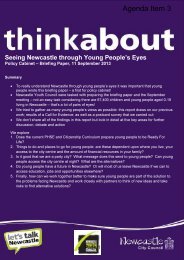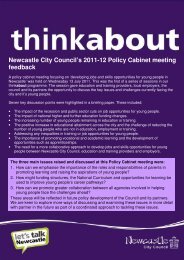NEWCASTLE'S MUSICAL HERITAGE AN INTRODUCTION By ...
NEWCASTLE'S MUSICAL HERITAGE AN INTRODUCTION By ...
NEWCASTLE'S MUSICAL HERITAGE AN INTRODUCTION By ...
Create successful ePaper yourself
Turn your PDF publications into a flip-book with our unique Google optimized e-Paper software.
masterpiece and was lately performed in Newcastle under very interesting<br />
circumstances. The scene of it is laid at Swalwell, his (Shield) native place, and<br />
its music is most charmingly simple and pastoral in character. Many of the songs<br />
will live as long as Englishmen love music, in proof of which we need only<br />
mention the names of “Old Towler”, “The Heaving of the Lead”, “The Wolf” and<br />
“The Thorn”. They rank with the songs of Purcell, Bishop and Arne, as being so<br />
thoroughly endowed with the spirit of English life and feeling’. Mr D’Oyly Carte’s<br />
Opera Co. began giving performances of Gilbert and Sullivan and he also joined<br />
Charles Wyndham in presenting other operatic works under the banner of the<br />
Olivette Opera Co. Miss Kate Santley, already mentioned above, the daughter of<br />
the famous English baritone, Sir Charles Santley (1834 – 1922), was an enduring<br />
favourite and her company appeared over many seasons. Light opera continued<br />
to pull in the crowds through 1888 and 1889 and there were ever new opera<br />
companies presenting new comedy operas and burlesques such as ‘The Nauch<br />
Girl’ (or ‘ The Rajah of Chutneypore’) On a more serious level there were the<br />
one-off performances such as the Grand Complimentary Concert for Mr<br />
J.H.Beers (one of the towns leading musicians) put on by the elite of the Musical<br />
Circles of Newcastle and Neighbourhood, On the whole though, Newcastle’s<br />
theatres were geared up to the best in musical entertainment (I have always<br />
considered opera to be a theatrical entertainment) In 1886 two hopefuls Van<br />
Biene and Horace Lingard, under the guise of the Comic Opera Co., put on an<br />
opera they had composed called ‘Falka’, which the theatre bills claimed, had<br />
notched up 1000 performances by 8 th April 1886. Such claims were common<br />
place in the theatre and reading the old handbills can be a great source of<br />
amusement as well as interest. ‘Powerful’ was a favourite adjective in Newcastle<br />
theatre handbills and posters – usually applied to the chorus, as though there<br />
were some need to reassure audiences that they would be able to hear them.<br />
One company went so far as to reassure theatregoers that the orchestra would<br />
play efficiently – giving the impression that most pit orchestras of the day were a<br />
shambles. <strong>By</strong> 1883 theatre programmes were beginning to point out to patrons<br />
that the Electric Bell would ring in the Royal Bars 3 minutes before curtain up.<br />
That was progress. The 1890s began to see a change in the kind of musical<br />
show put on in the theatre; a new look appeared on the playbills of the Theatre<br />
Royal, which was due largely to the fact that English language musicals were<br />
beginning to make an impact on the world of musical theatre, not only in England<br />
but across Europe.<br />
The impact came from London and mostly from the theatres run by that<br />
legendary producer, George Edwardes, known to all as ‘The Guv’ner’. The basic<br />
plots and scheme of things in his musical shows were not so different from those<br />
that had been presented before but instead of fictitious and mythical characters<br />
from the past he peopled his shows with up to date characters, recognisable<br />
modern types who spoke in up-to-date language and wore clothes that were the<br />
height of fashion in the early years of the decade. The first of Edwardes’<br />
presentations at the Theatre Royal in 1893 was ‘In Town’ It was nowhere as<br />
sophisticated as these shows were to become, but it was the beginning of<br />
56

















